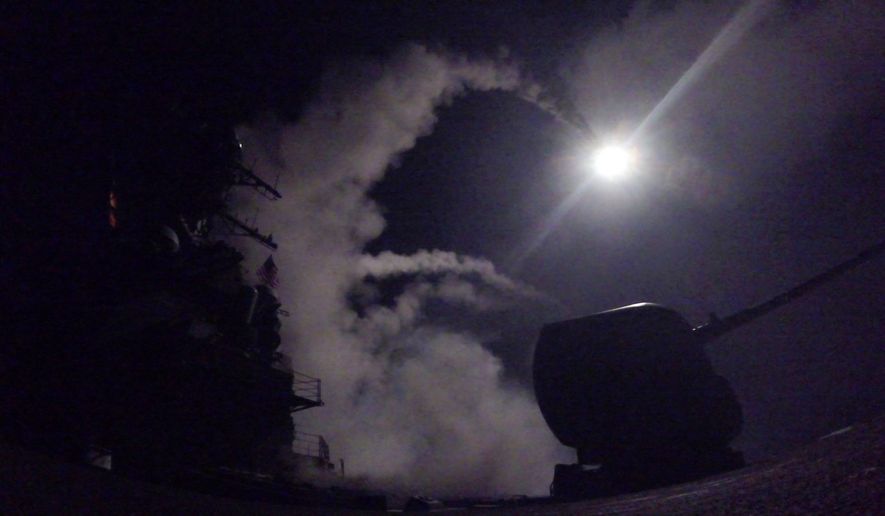Pentagon officials are exploring the possibility that Russian warplanes struck a Syrian hospital treating victims of Tuesday’s chemical attack in an attempt to destroy evidence linking Damascus to the deadly strike.
U.S. officials are still trying to determine who is responsible for the hospital strike, which took place hours after forces loyal to Syrian President Bashar Assad launched a chemical strike against the rebel stronghold of Idlib province. The attack, in which munitions were armed with sarin nerve gas, left over 70 dead, including 11 children.
The Arleigh-Burke class destroyers USS Porter and USS Ross launched 60 Tomahawk cruise missiles early Friday morning into Alawite-dominated region of western Syria in response to the chemical strike.
The strikes were centered on the al Shayrat airfield near the western Syrian city of Homs, from where U.S. intelligence officials believe the chemical strikes were launched. The airfield was roughly 100 miles south of Latakia, Russia’s main military hub in the country.
American commanders did notify their Russian counterparts ahead of the naval bombardment, according to the Pentagon.
Initial damage assessments show Syrian aircraft and support facilities at the airfield had been destroyed, “reducing the Syrian Government’s ability to deliver chemical weapons,” Pentagon spokesman Capt. Jeff Davis said in a statement Thursday night, shortly after the U.S. counter-strike.
SEE ALSO: Democrats push to link Syria strike, refugee ban
Tuesday’s chemical weapons attack was the third time regime forces used such weapons since a 2013 pact with Russia to dismantle his chemical stockpile and the deadliest since a Syrian attack using weaponized chlorine bombs struck Idlib that year.
“We know the Russians have chemical weapons expertise in country,” a senior military official said, noting any details regarding collusion between Moscow and Damascus on chemical weapon capabilities could not be discussed publicly.
“We are carefully assessing any information that would implicate that the Russians knew or assisted with this Syrian [chemical weapons] capability,” the official said, speaking on the condition of anonymity.
“At a minimum, the Russians failed to reign in Syrian activity” regarding the regime’s chemical weapons program, the official told reporters at the Pentagon Friday. At worst, Moscow actively took measures to willfully destroy any evidence of Assad forces using chemical weapons.
U.S. intelligence officials spotted a Russian drone conducting aerial surveillance over hospital, which was being used as a casualty collection point for victims of the Idlib strike.
“Some hours later, the [drone] returned and the hospital was struck” by a conventional airstrike, the official said.
“We don’t know who struck [the hospital], we do not have positive accountability yet,” the official said. “But the fact that someone would strike the hospital — potentially to hide the evidence of a chemical attack … is a question that we are very interested in.”
Moscow thus far has denied any involvement with the sarin attack or any subsequent strikes against anti-government targets in the area. Officials from the Russian Ministry of Defense on Friday said it was suspending communications with U.S. counterparts geared toward deconflicting operations in Syria.
U.S. and Russian commanders have kept close communications since Moscow began its Syrian operations in support of the Assad regime in earnest. Moscow and Washington say the communications were strictly designed to ensure American and Russian air assets do not interfere with each other’s operations.
The ongoing offensive by al Qaeda factions in Syria against government positions in the country’s north prompted the Idlib chemical strike, according to the Defense Department.
Fighters from Hay’at Tahrir Al-Sham, a faction of the former Syrian al Qaeda cell now known as Jabhat Fateh al-Sham, have overrun government forces in the central Syrian cities of Qomhana and Ma’an, 30 miles south of anti-government stronghold of Idlib.
As Syrian forces continued to lose ground, fears grew that the regime’s military airfield in Hama was at risk of being overrun, the official said Friday.
“This was a significant risk to the regime,” the official said, characterizing the sarin gas attack was “a battlefield desperation decision to stop the opposition from seizing those key regime elements.”
• Carlo Muñoz can be reached at cmunoz@washingtontimes.com.




Please read our comment policy before commenting.